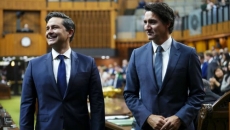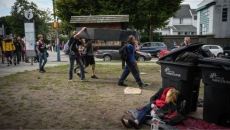A majority of Canadians think the federal government should spend more on health care, a housing strategy and initiatives to ease inflation and cost-of-living issues, a new poll suggests — but they also want it to freeze or reduce other spending.
Nearly three-quarters of respondents to the new Leger poll, or 71 per cent, said the federal government should spend more on health care and health transfers to the provinces.
Only three per cent of the 1,545 Canadian respondents polled over the weekend said the government should spend less.
The poll does not have a margin of error because online polls aren’t considered truly random samples.
When it comes to a housing strategy and initiatives to tackle inflation and cost-of-living issues, 66 per cent said they were in favour of increasing government spending, and only six per cent said it should decrease.
But most respondents wanted the government to reduce or maintain other spending, including on national defence, services to Indigenous communities and international aid.
International aid in conflict zones or developing countries was the category at the bottom of the list, with 45 per cent saying spending should be cut. Only 12 per cent of respondents said the government should spend more.
Christian Bourque, executive vice-president at Leger, pointed out in an interview that that doesn't necessarily translate to Canadians' views on conflicts, since survey respondents tend to favour domestic spending over international dollars.
For example, he said, other polls show a majority of Canadians believe the government of Canada should support Ukraine in its fight against Russian invaders.
Just under one-third of respondents to the poll, or 31 per cent, said the government should cut funding for cultural and heritage initiatives, while 12 per cent were in favour of increasing it.
The respondents were also asked to agree or disagree with a variety of statements about the overall federal budget.
A large majority, 83 per cent, agreed that increases in federal spending should be capped to avoid fuelling inflation.
A slightly smaller number, 79 per cent, said that federal spending should be reduced to "come back to balanced budgets in a few years."
Just over two-thirds of the respondents, or 67 per cent, said federal spending should be frozen to "rein in deficits and get back to a balanced budget."
But on the other hand, 72 per cent agreed that returning to balanced budgets "too quickly" would hurt "certain categories of the population."
Despite all that, just over half, 56 per cent, indicated they didn't want to see government spending limited at all, at least not now. They agreed with the statement that it's not the right time to limit spending increases because there are "too many pressing social and economic issues in Canada right now."
Bourque said the contradictory results indicate Canadians are "balanced" in terms of what they expect when it comes to spending limits in Ottawa.
"Somebody meaner than me would say they want (to have) their cake and eat it too," he said.
"Do they want to curb spending? Yes. Do they want us to continue to spend on making Canadians’ lives better? Yes."
The takeaway for the government, Bourque said, is to be "measured and reasonable" when it comes to spending.
Thirty per cent wanted more government funds for national defence, while 21 per cent wanted less defence spending. Similarly, 29 per cent were in favour of the government spending more on services to Indigenous communities, while 23 per cent wanted that spending cut.
A further 28 per cent of respondents said they wanted more spending on benefits provided through the Department of Employment and Social Development Canada. Thirteen per cent wanted less funds for those government benefits.






